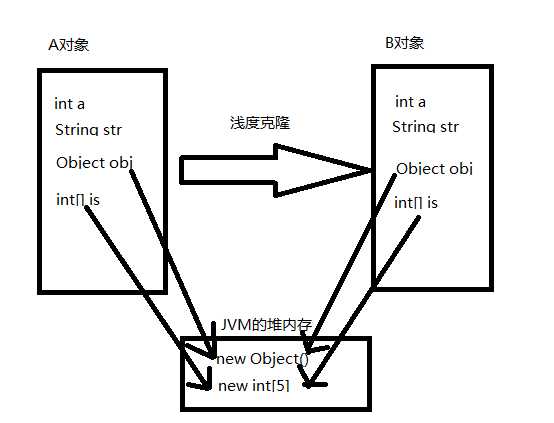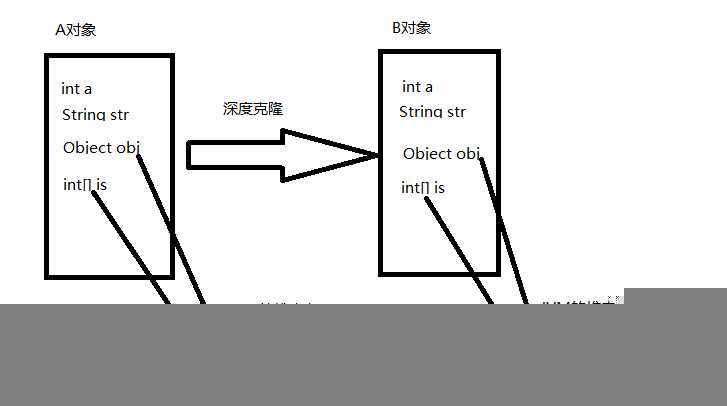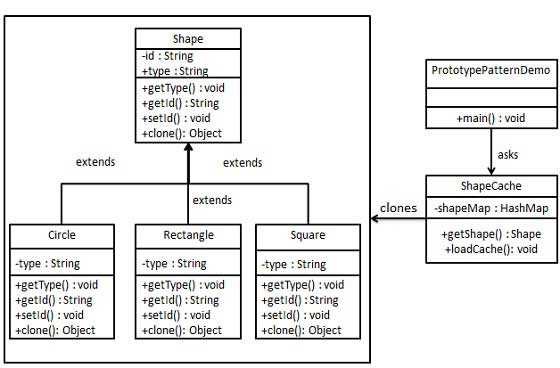设计模式——创建型模式之原型模式
Posted fan-design-pattern
tags:
篇首语:本文由小常识网(cha138.com)小编为大家整理,主要介绍了设计模式——创建型模式之原型模式相关的知识,希望对你有一定的参考价值。
原型模式
原型模式(Prototype Pattern)是用于创建重复的对象,同时又能保证性能。这种类型的设计模式属于创建型模式,它提供了一种创建对象的最佳方式。
这种模式是实现了一个原型接口,该接口用于创建当前对象的克隆。当直接创建对象的代价比较大时,则采用这种模式。例如,一个对象需要在一个高代价的数据库操作之后被创建。我们可以缓存该对象,在下一个请求时返回它的克隆,在需要的时候更新数据库,以此来减少数据库调用。
关键代码: 1、实现克隆操作,在 JAVA 继承 Cloneable,重写 clone(),在 .NET 中可以使用 Object 类的 MemberwiseClone() 方法来实现对象的浅拷贝或通过序列化的方式来实现深拷贝。 2、原型模式同样用于隔离类对象的使用者和具体类型(易变类)之间的耦合关系,它同样要求这些"易变类"拥有稳定的接口。
应用实例: 1、细胞分裂。 2、JAVA 中的 Object clone() 方法。
优点: 1、性能提高。 2、逃避构造函数的约束。
缺点: 1、配备克隆方法需要对类的功能进行通盘考虑,这对于全新的类不是很难,但对于已有的类不一定很容易,特别当一个类引用不支持串行化的间接对象,或者引用含有循环结构的时候。 2、必须实现 Cloneable 接口。
注意事项:与通过对一个类进行实例化来构造新对象不同的是,原型模式是通过拷贝一个现有对象生成新对象的。浅拷贝实现 Cloneable,重写,深拷贝是通过实现 Serializable 读取二进制流。如图:


实现
我们将创建一个抽象类 Shape 和扩展了 Shape 类的实体类。下一步是定义类 ShapeCache,该类把 shape 对象存储在一个 Hashtable 中,并在请求的时候返回它们的克隆。
PrototypePatternDemo,我们的演示类使用 ShapeCache 类来获取 Shape 对象。

步骤 1
创建一个实现了 Cloneable 接口的抽象类。
1 public abstract class Shape implements Cloneable 2 3 private String id; 4 protected String type; 5 6 abstract void draw(); 7 8 public String getType() 9 return type; 10 11 12 public String getId() 13 return id; 14 15 16 public void setId(String id) 17 this.id = id; 18 19 20 public Object clone() 21 Object clone = null; 22 try 23 clone = super.clone(); 24 catch (CloneNotSupportedException e) 25 e.printStackTrace(); 26 27 return clone; 28 29
步骤 2
创建扩展了上面抽象类的实体类。
1 public class Rectangle extends Shape 2 3 public Rectangle() 4 type = "Rectangle"; 5 6 7 @Override 8 public void draw() 9 System.out.println("Inside Rectangle::draw() method."); 10 11
1 public class Square extends Shape 2 3 public Square() 4 type = "Square"; 5 6 7 @Override 8 public void draw() 9 System.out.println("Inside Square::draw() method."); 10 11
1 public class Circle extends Shape 2 3 public Circle() 4 type = "Circle"; 5 6 7 @Override 8 public void draw() 9 System.out.println("Inside Circle::draw() method."); 10 11
步骤 3
创建一个类,从数据库获取实体类,并把它们存储在一个 Hashtable 中。
1 import java.util.Hashtable; 2 3 public class ShapeCache 4 5 private static Hashtable<String, Shape> shapeMap 6 = new Hashtable<String, Shape>(); 7 8 public static Shape getShape(String shapeId) 9 Shape cachedShape = shapeMap.get(shapeId); 10 return (Shape) cachedShape.clone(); 11 12 13 // 对每种形状都运行数据库查询,并创建该形状 14 // shapeMap.put(shapeKey, shape); 15 // 例如,我们要添加三种形状 16 public static void loadCache() 17 Circle circle = new Circle(); 18 circle.setId("1"); 19 shapeMap.put(circle.getId(),circle); 20 21 Square square = new Square(); 22 square.setId("2"); 23 shapeMap.put(square.getId(),square); 24 25 Rectangle rectangle = new Rectangle(); 26 rectangle.setId("3"); 27 shapeMap.put(rectangle.getId(),rectangle); 28 29
步骤 4
PrototypePatternDemo 使用 ShapeCache 类来获取存储在 Hashtable 中的形状的克隆。
1 public class PrototypePatternDemo 2 public static void main(String[] args) 3 ShapeCache.loadCache(); 4 5 Shape clonedShape = (Shape) ShapeCache.getShape("1"); 6 System.out.println("Shape : " + clonedShape.getType()); 7 8 Shape clonedShape2 = (Shape) ShapeCache.getShape("2"); 9 System.out.println("Shape : " + clonedShape2.getType()); 10 11 Shape clonedShape3 = (Shape) ShapeCache.getShape("3"); 12 System.out.println("Shape : " + clonedShape3.getType()); 13 14
步骤 5
执行程序,输出结果:
1 Shape : Circle 2 Shape : Square 3 Shape : Rectangle
(以上知识及实列出自runoob.com 原文链接:https://www.runoob.com/design-pattern/singleton-pattern.html)
以上是关于设计模式——创建型模式之原型模式的主要内容,如果未能解决你的问题,请参考以下文章